Too Many Would Accept Only Straight Hair, She Says
It’s Official: Diverse Pair to Host ‘NewsHour’:
Amna Nawaz, Geoff Bennett to Anchor PBS Mainstay
Black Weekly First to Declare Bass Win in L.A.
Fox Retreats From Violent Crime After Midterms
Journalists Refuse to Replace Evicted Migrants
. . . Black Migrants Under Assault in Dominican Republic
Critic Hears From Vitriolic Chappelle Fans
Yearlong Program Seeks to Train Cultural Critics
Hannah-Jones Launches Center at Howard U.
Imani Perry, Sabaa Tahir Win Book Awards
Short Takes: Joshua Johnson; trauma support for journalists; Al Roker; Will Sutton and still-needed COVID precautions; Trump, DeSantis and Florida; Lisa Ling; Wil Haygood; Mexican-American journalist in Ukraine; Laura Jarrett; apology over reference to “indigenous creature”; Arab and African journalists against slavery; imprisoned Cuban journalist Lázaro Yuri Valle Roca
Homepage photo: Michelle Obama with Ellen DeGeneres (Credit: Twitter)
Support Journal-isms
Too Many Would Accept Only Straight Hair, She Says
In remarks to which Black women with on-air jobs in television, particularly, can relate, former first lady Michelle Obama said this week that she “considered wearing her hair in braids while living in the White House. But then she thought of the American people,” Jonathan Edwards reported Thursday for The Washington Post.
“They were ‘just getting adjusted’ to having a Black president in the Oval Office and a Black family in the White House, so she decided to keep her hair straight, Obama said at the Warner Theatre in Washington on Tuesday, the first of a 13-night cross-country tour to promote her new book, ‘The Light We Carry: Overcoming in Uncertain Times.’
“It would have been easier to keep her hair in braids, Obama said, but ‘nope, they’re not ready for it,’ she added, recalling her thinking at the time.
“So she sacrificed doing her hair as she would have liked so her husband’s administration could focus on achieving its goals instead of sinking political capital into putting out a hairstyle-induced firestorm. ‘Let me keep my hair straight,’ Obama said of her mind-set at the time. ‘Let’s get health care passed.’
“Obama said her dilemma was an extreme example of the decisions Black women make daily to navigate the politics and sensibilities of their workplaces. They often find it easier, healthier and safer to wear braids, dreadlocks or Afros, but feel the pressure from White beauty standards and workplace norms to chemically straighten their hair for a more professional, ‘clean-cut’ appearance. ‘We deal with it, the whole thing about, “Do you show up with your natural hair?”‘ Obama said.
“Attitudes about natural Black hairstyles, such as braids and dreadlocks, have shifted. Earlier this year, the House passed the Crown Act, legislation that would prohibit discrimination based on someone’s hairstyle, including those ‘in which hair is tightly coiled or tightly curled, locs, cornrows, twists, braids, Bantu knots, and Afros.’ ”
In her 2021 book “Ladies Leading: The Black Women Who Control Television News,” excerpted in Journal-isms, Ava Thompson Greenwell of Northwestern University wrote, “Although television newsroom culture has become more accepting of natural hairstyles, the industry has a history of rejecting Black women’s unaltered hair. . . .
“Since the women featured in this book generally do not appear on camera, natural hairstyles were more acceptable. Yet some of those integrating newsroom management ranks for the first time chose assimilationist styles as a mechanism of self-preservation and ease of maintenance. They perceived that if the institution did not like their natural hair, it would not like them either. Those who wore natural styles, such as Afros, braids or dreadlocks, sometimes received subtle cues about the way to wear their natural hair.”
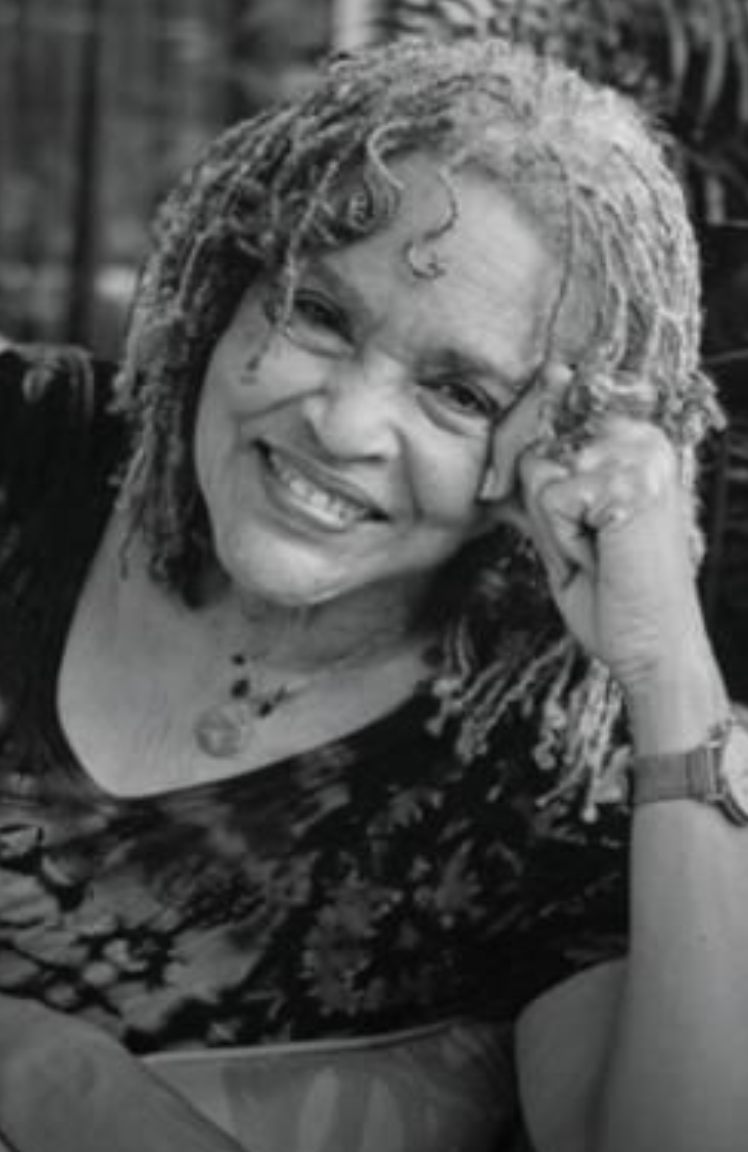 When this column wrote about the issue in 2009, veteran journalist Charlayne Hunter-Gault (pictured) recalled being the first to wear braids on a national show. “I got my hair braided in Kenya on the way back from Somalia when I was still at the NEWSHOUR,” she told Journal-isms via email. “And while no one on the Newshour had any objections — it actually was never discussed once I pitched up with braids. But the reaction from some in the Newshour audience was surprising. We had a higher than usual intellectual base and yet, some wrote: what can we expect next: Robert MacNeil with a ring in his nose?”
When this column wrote about the issue in 2009, veteran journalist Charlayne Hunter-Gault (pictured) recalled being the first to wear braids on a national show. “I got my hair braided in Kenya on the way back from Somalia when I was still at the NEWSHOUR,” she told Journal-isms via email. “And while no one on the Newshour had any objections — it actually was never discussed once I pitched up with braids. But the reaction from some in the Newshour audience was surprising. We had a higher than usual intellectual base and yet, some wrote: what can we expect next: Robert MacNeil with a ring in his nose?”
More recently, though, Ramon Escobar, senior vice president for talent recruitment & development at CNN Worldwide, declared at a Journal-isms Roundtable last year that at his network, “if people want to wear their hair naturally, that’s who they are, and that’s, you know, an expression of their authentic self. We have been very, very clear about this at our organization.”
CNN even “worked hard, also, to get some folks behind the scenes on the hair and makeup team. If you’re going to be diverse, you should be diverse in every area.”
- Brittany Bailer, The Dig, Howard University: Howard University hosts Congress Members for Glory: Conversations on the CROWN Act
- Journal-isms: Heads Up on Risks of Hair-Straightening (Oct. 26)
- Judith Newman, New York Times: Michelle Obama Has Some Advice
- Darlene Superville, Associated Press: Michelle Obama opens tour for new book, ‘The Light We Carry’
- Elizabeth Wellington, Philadelphia Inquirer: Michelle Obama shares ways to get through uncertainty in ‘The Light We Carry’
It’s Official: Diverse Pair to Host ‘NewsHour’
Amna Nawaz, Geoff Bennett to Anchor PBS Mainstay
It’s official: “Amna Nawaz and Geoff Bennett have been named co-anchors of the PBS NewsHour,” PBS announced Wednesday, confirming media reports that surfaced last May (scroll down). “They will succeed Judy Woodruff who recently announced she’s stepping aside at the end of 2022. The PBS NewsHour, co-anchored by Nawaz and Bennett, will launch on Monday, January 2, 2023.
“The move marks a generational shift at the show and is a reflection of a younger, more diverse country it aims to cover,” Oliver Darcy wrote for CNN. “Bennett, 42, is Black and Nawaz, 43, is the first-generation American daughter of Pakistani parents.”
Nawaz said in a statement: “Today is a day I never could’ve imagined when I began my journalism career years ago, or while growing up as a first-generation, Muslim, Pakistani-American. I’m grateful, humbled, and excited for what’s ahead.”
The move is also emblematic of a passing of the torch among journalists of color. In an appearance at the Journal-isms Roundtable in February, Bennett said, “My era of journalists, we’re all sort of coming into our own at the same time. Yamiche [Alcindor] at NBC. Abby Phillip at CNN. Aisha Rascoe was just named a host of ‘Weekend Edition Sunday’ at NPR, which is a show I used to be editor of back when Liane Hansen and Rachel Martin were hosts of that show.
“Kenneth Moton and Rachel Scott over at ABC. Weija Jiang at CBS. So I’m glad to be in that number, and we collectively have you folks to thank for knocking down doors to make our path a little easier,” the Morehouse College graduate said, addressing the veterans. “So I appreciate that.” (video; Bennett is at 5:00).
Darcy wrote in CNN’s “Reliable Sources” newsletter that in a joint interview Wednesday, Nawaz said, “The enormity of the moment is not lost on us when you look at the history and legacy of this place.“
“The duo stressed that the central elements of ‘NewsHour’ will remain in place. So don’t expect any seismic changes. The show, after all, has built up a loyal audience over its many decades on air and a sudden shift in programming strategy could alienate viewers. As Bennett explained, he and Nawaz want to simply ‘build on the foundation that exists.’
” ‘The core of what we do will not change at all. But, yeah, we do bring different backgrounds to the desk,’ Bennett said, noting that both he and Nawaz are also parents to young children.
” ‘We have come to this role with different journeys,’ Nawaz added.
“But while significant structural changes shouldn’t be expected on the show, ‘NewsHour’ viewers will still see a different program with the anchors bringing their own distinctive styles. And, simply by the function of having two anchors, they will, as Nawaz put it, be able to ‘go out into the field and get closer to the story.’ One anchor can remain at the desk while another is deployed to the field.
” ‘NewsHour’ is also working to modernize how it delivers the news to reach younger, more mobile-centric audiences. The show has launched a TikTok channel and attracts about a million YouTube viewers each day. On TikTok, the show recently started hosting live discussions with PBS reporters and outside experts. ‘We’re excited to expand how we interact with our live audience on the platform,’ a spokesperson for the program told me.
” ‘NewsHour’ is so much bigger than just an hour of television,’ Nawaz told me, adding that younger viewers interact with the show in totally different ways.
” ‘Any time I am on a college campus, they say they follow us on Instagram or see our stuff through a TikTok update,’ she said. ‘We are putting our content out in so many ways and meeting viewers where they are.’ “
- Amna Nawaz and Nana Adwoa Antwi-Boasiako, “PBS NewsHour”: Study suggests link between chemical hair straighteners and chances of uterine cancer (video) (Nov. 21)
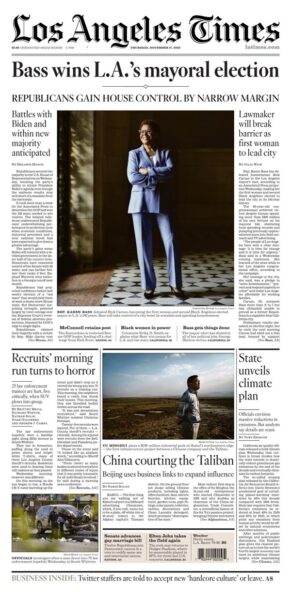
Black Weekly First to Declare Bass Win in L.A.
The Los Angeles Sentinel, a Black weekly, became the first news organization in the city to declare Rep. Karen Bass, D-Calif., winner of the Los Angeles mayoralty contest, the paper said in its Wednesday edition.
Not only will Bass be the city’s first female mayor, but her victory means the nation’s four largest cities will have Black mayors — Eric Adams in New York, Bass in Los Angeles, Lori Lightfoot in Chicago and Sylvester Turner in Houston.
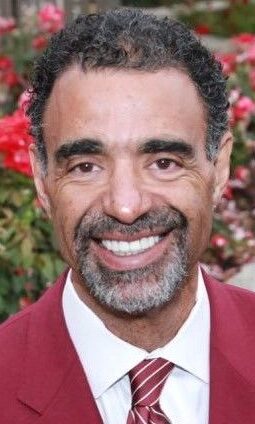 “We called the race Tuesday night at about 11:30 pm as we were finalizing our paper to go to print Wednesday morning,” Executive Editor Danny Bakewell Jr. (pictured), who wrote the paper’s story, messaged Journal-isms. “Mathematically Rick Caruso,” Bass’ Republican opponent, “would have had to win every ‘voter dump’ remaining by over 56% in order to win and had not [won] a single dump.
“We called the race Tuesday night at about 11:30 pm as we were finalizing our paper to go to print Wednesday morning,” Executive Editor Danny Bakewell Jr. (pictured), who wrote the paper’s story, messaged Journal-isms. “Mathematically Rick Caruso,” Bass’ Republican opponent, “would have had to win every ‘voter dump’ remaining by over 56% in order to win and had not [won] a single dump.
“Votes are no longer counted by precincts they are counted city wide, so there was no indication that the trend would change and certainly not enough to change the outcome as confirmed 20 hours later by every other news agency.”
The Associated Press said it called the race for Bass at 3:35 p.m. Pacific time on Wednesday.
The Los Angeles Times reported that AP was projecting that Bass would win around 3:48 p.m. PT Wednesday, “and I think we updated our live election results (showing Bass was projected to win) a little earlier, around 3:20pm,”
Times spokesperson Hillary Manning said Thursday. AP projections gave the Democratic six-term member of Congress 53.1 percent of the vote to 46.9 percent for Caruso.
The Times’ story about Bass’ victory was also notable for its identification of Caruso, a wealthy real-estate developer, as “a white man” in a medium where “white” is usually the unstated default.
However, Manning explained, “Los Angeles Times style is to mention the racial and ethnic background of people in the news when it is relevant. In our story about Karen Bass and Rick Caruso, each of their races is mentioned.
“Bass is the first woman and second Black person elected mayor of Los Angeles. There was some discussion about Caruso’s race when, during a mayoral debate hosted by the local NBC and Telemundo stations, he said he was Italian and added, ‘that’s Latin.’ Given the historic nature of Bass’ election and the intense discussions about race, ethnicity and identity following the leaked audio of former L.A. City Council President Nury Martinez and Councilmembers Kevin de Leon and Gil Cedillo, it seems relevant to note that Caruso is white.
“And here is the clip of Caruso saying ‘that’s Latin.’
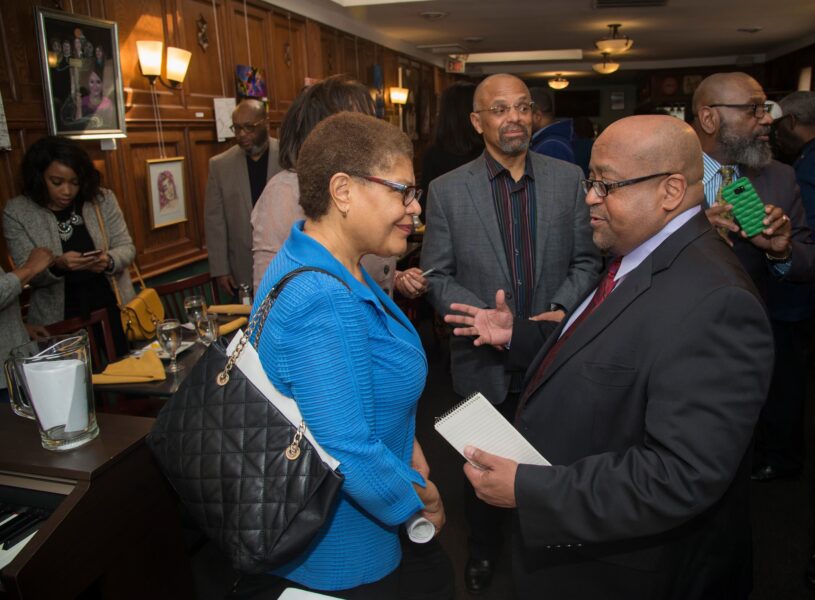
Bass described herself as a “news junkie” at an appearance before the Journal-isms Roundtable in March 2019, when she began her tenure as chair of the Congressional Black Caucus.
“My goal is that by December 2020 for Black America to know what the Black Caucus does, and for the Black Caucus to demonstrate how we use our power to impact the daily lives of African Americans and everybody in the United States,” Bass told the group. “One of the things that we’re doing is my request for coverage because I enjoy the press, you know. I’m a news junkie and I like doing it, but we can’t get coverage. The TV — print is a little different, but not much. ‘Cause you call up and pitch stories and they won’t put you on.
“They’ll put on the same five white guys every single day, and you would have no idea there’s 55 members of Congress [in the Caucus] — so what we plan to do is, we plan to go en masse — once a month to members’ districts and to have the community see us in our formal roles.”
That plan did not come to pass, but Bass was able to capitalize on her ties to Los Angeles’ Black and progressive communities when she ran for mayor.
“Long before she became the first Black woman to lead a legislative body as California Assembly speaker, Bass’ community-based leadership frequently brought her to City Hall as an advocate pushing lawmakers from outside the system,” Julia Wick wrote for The Times.
“Watching Karen Bass be given her flowers for becoming the first woman and only the second Black person to be elected mayor of Los Angeles, I can’t help but think of how much has changed in California over the past two years,” Times columnist Erika D. Smith wrote Thursday, the morning after the historic vote count was announced.
“For it was in December 2020 that I had a long conversation with then-Assemblymember Shirley Weber about the ‘bleak’ state of political power for Black women in this proudly liberal and diverse state. . . .”

Fox Retreats From Violent Crime After Midterms
“Fox News significantly decreased its volume of violent crime coverage in the week of the midterms, down 63% from the week prior,” Tyler Monroe and Rob Savillo reported Thursday for Media Matters for America.
“The network averaged 141 weekday violent crime segments per week from Labor Day through the Friday before the election; in the week of the midterms, Fox aired 71 weekday violent crime segments — a decrease of 50% compared to the prior average.
“Fox was open in its strategy of using violent crime as a political cudgel against Democrats throughout the midterms. Driven in part by Fox host Tucker Carlson’s calls for Republicans to run on the issue, the network engaged in a monthslong campaign to tie Democrats and the Biden administration to violent crime, often by highlighting specific incidents in ‘Democratic cities’ and blaming progressive criminal justice reform for individual violent crimes. . . .”
- Nicole Acevedo, NBC News: Young Latino voters favored Democrats despite party affiliation, boosting their chances in contested races (Nov. 11)
- Perry Bacon Jr., Washington Post: Nancy Pelosi’s strategies were flawed. Democrats must move on from them.
- Charles M. Blow, New York Times: Trump’s Moment Has Passed
- Charles M. Blow, New York Times: An Ode to Stacey Abrams
- Hayes Brown, MSNBC: Brian Kemp’s defeat of Stacey Abrams bodes ill for voting rights
- Mary C. Curtis, Roll Call: Which party has a game plan for the future? We’re about to find out
- Robin Givhan, Washington Post: Speaker Pelosi’s style of power
- Ashley Gold and Sara Fischer, Axios: Why misinformation didn’t wreck the midterms
- Jean Guerrero, Los Angeles Times: The rise of the Republican Latino isn’t real, but it could be in 2024
- Emil Guillermo, Asian American Legal Defense and Education Fund: Was the ethnic vote America’s Blue Wave rising…or falling?
- Suzette Hackney, USA Today: Nancy Pelosi built a legacy for generations to come. That’s what real leaders do.
- Anthony Izaguirre, Associated Press: Judge blocks DeSantis law on barring ‘woke’ education
- Ruben Navarrette Jr., Washington Post Writers Group: Fueled by envy, Trump unleashes friendly fire on fellow Republicans
- Clarence Page, Chicago Tribune: Michael Moore got the last laugh this Election Day
- Leonard Pitts Jr., Miami Herald: A few words on the silence
- Eugene Robinson, Washington Post: Nancy Pelosi was the most consequential speaker of our time
“Thousands of workers died during Qatar 2022 World Cup-related construction, far more than in the run up to every other World Cup or Olympic Games in the past 30 years combined,” the Voice of America reports. “This short documentary mixes firsthand accounts from families of the deceased in Nepal, explaining how so great a tragedy surrounds so celebrated an event — with no governments, organizations or companies taking responsibility.” (Credit: Voice of America)
Journalists Refuse to Replace Evicted Migrants
“Finland’s largest daily Helsingin Sanomat has cancelled its journalists’ assignment to Qatar to cover the soccer World Cup after finding out they would be [accommodated] in apartments from which migrant workers had been evicted, the paper’s editor said on Friday,” Anne Kauranen reported for Reuters.
“Qatar is the first Middle Eastern country to be picked by FIFA to host the World Cup but it has come under intense pressure for its treatment of foreign workers and restrictive social laws.
“The Finnish paper’s head of sports Erkki Kylmanen told Reuters restrictions imposed on journalists in advance by the Qatari authorities had led the paper to mull over for several months whether or not to travel on site to Qatar, but eventually he decided to cancel the trip just a few weeks ago. . . .
“Kylmanen referred to Al Sadd and Al Mansoura districts in the centre of the Qatari capital Doha where authorities emptied apartment blocks housing thousands of Asian and African workers some weeks ago to free up rooms for visiting soccer fans.
” ‘It is quite an unsound situation if we go there to write critical stories but go to bed in a place where people have been evicted from our way,’ he said.”
- Editorial, Chicago Tribune: Beer is the least of the issues with the World Cup in Qatar
- Human Rights Watch: Qatar: FIFA World Cup Opens Without Remedy for Migrants
- Aimee Lewis, Pramod Acharya and Sugam Pokharel, CNN: ‘Our dreams never came true’. These men helped build Qatar’s World Cup, now they are struggling to survive
- Sarah Lyall, New York Times: The 2022 World Cup is being hosted in Qatar, which, as everyone knows, is pronounced . . . (Nov. 21)
- Bron Maher, Press Gazette, Britain: Journalists have Qatar World Cup visas ‘revoked’ after Iranian ‘terrorist’ designation
- Tariq Panja and Bhadra Sharma, New York Times: The World Cup’s Forgotten Team
- Jim Waterson, the Guardian: BBC ignores World Cup opening ceremony in favour of Qatar criticism
. . . Black Migrants Under Assault in Dominican Republic
. . . Migrants are also under assault in the Dominican Republic, Carlos Edill Berríos Polanco reported Thursday for Latino Rebels. “Videos have flooded out of the Dominican Republic in recent days showing security forces corralling Black people outside their homes and loading them into cages on migrant control trucks to be carted off and, presumably, placed in detention centers or deported.
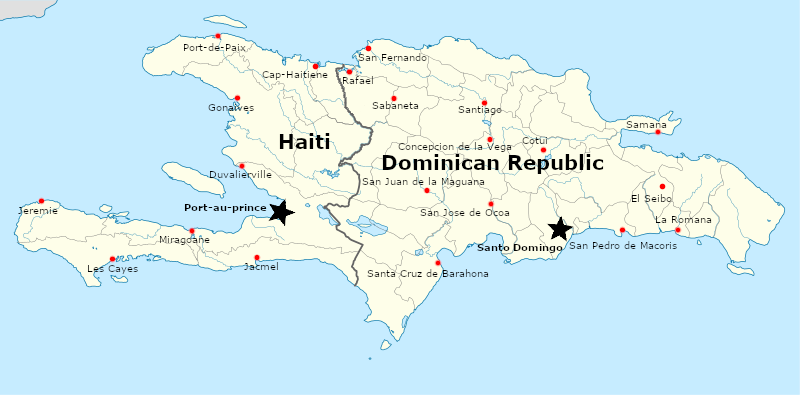 “These arrests are a drastic ramp-up of President Luis Abinader’s anti-Haitian policies enabled through Decree 688-22 and issued on Friday. The decree, which has yet to be signed into law, was issued ‘for the prevention and persecution of invasions and irregular occupations of private and state property,’ the order reads.
“These arrests are a drastic ramp-up of President Luis Abinader’s anti-Haitian policies enabled through Decree 688-22 and issued on Friday. The decree, which has yet to be signed into law, was issued ‘for the prevention and persecution of invasions and irregular occupations of private and state property,’ the order reads.
“It also creates a new specialized division of the National Police whose sole purpose is to pursue ‘foreigners’ that illegally occupy such properties.
“ ‘At any moment they can take us because we’re Haitian and they don’t want us on their land,’ an undocumented Haitian immigrant, who asked to remain anonymous for fear of government reprisal, told Latino Rebels.
“A large share of Haitian migrants in the Dominican Republic come seeking better living conditions and jobs that can help them escape the turmoil in their home country. The unnamed Haitian immigrant who spoke with Latino Rebels said he and his partner initially came to the Dominican Republic because they were looking for work and because ‘there was no security in Haiti.’
“More than 4,500 people were arrested on Monday alone with the intent to deport them, according to official figures provided by the Dominican government. Venancio Alcántara, director of migration, has aimed to deport about 20,000 people, mostly Haitians, since he came into office in August. . . .”
- Caitlin Hu and Etant Dupain, CNN: Exclusive: Dominican Republic expelled hundreds of children to Haiti without their families this year (Nov. 21, updated Nov. 22)
- Watch Nov. 20 Journal-isms Roundtable on Facebook: What about the Black and Asian asylum seekers? And other undercovered immigration stories.
Critic Hears From Vitriolic Chappelle Fans
In the wake of his critique of Dave Chappelle’s Nov. 12 “Saturday Night Live” monologue discussing antisemitism, NPR television critic Eric Deggans shared some of the “punishing deluge of responses on social media aimed at attacking me as a Black man.
“According to these diatribes, I was a traitor to my race, a biscuit-eating sellout, a coonish, Uncle Tom/Sambo who allowed his Jewish paymasters to dictate his writing.
“All for having the gall to say I was disappointed in Chappelle’s latest performance.
“Of course, it’s difficult to tell which of these accounts might have been bots or malicious hackers more interested in sowing division and hate than any logical argument. But some of the arguments raised in these spaces nevertheless echoed justifications and defenses I’d seen delivered by actual people – inadvertently embodying my concerns about Chappelle’s original comments encouraging those who believed terrible stereotypes about Jewish people.
“And, as always, it was discouraging that we seem to be having the same discussions about stereotyping and fairness which once seemed resolved years ago – reignited by a performer whose oblique and provocative comedy touches nerves without really offering any resolution.
“Chappelle’s superpower as a performer – something he’s bragged about in the past – is his ability to control an audience, bringing laughs when he wants, stunned silence in other moments. Indeed, his SNL monologue is a masterclass in saying just enough so that fans can defend his words, while sidestepping their more provocative implications.
“At issue – for me, at least – was whether Chappelle was minimizing and providing tacit cover for the antisemitic actions of Kanye West and Kyrie Irving. . . .
“The fact is, our modern media argument culture doesn’t allow a lot of space for nuanced discussion. . . .”
- Ashley D. Farmer, Harpers Bazaar: How Kanye West Uses the Language of Black Liberation to Support White Supremacy
- John W. Fountain, Chicago Sun-Times: Kanye and Kyrie Irving? African Americans have much bigger things to worry about (Nov. 11)
- Lisa Respers France, CNN: Dave Chappelle’s ‘SNL’ monologue sparks backlash as being antisemitic
- Tom Murray, the Independent, Britain: Jerry Seinfeld reacts to Dave Chappelle’s controversial SNL monologue about antisemitism
- Sharon Rosen Leib, Forward: An open letter to Dave Chappelle from the great-granddaughter of a Hollywood pioneer
- J. Kim Murphy, Variety: Jon Stewart Defends Dave Chappelle’s ‘SNL’ Monologue: ‘Censorship’ Doesn’t End Antisemitism
Critical Minded from Nathan Cummings Foundation on Vimeo.
Yearlong Program Seeks to Train Cultural Critics
“The New York Times today announced that Critical Minded will fund its new program to seek out, develop and publish cultural critics from underrepresented backgrounds who have little or no experience contributing to The Times Culture section,” the news organization said Wednesday.
“The one-year program will assign an editor to recruit freelance critics and coach them on how to write for a national publication with the goal of publishing their work in The Times. The program will help critics build rapport and learn from Times editors, setting them up for more opportunities to showcase their cultural viewpoints at The Times and other news organizations.
“ ‘I’m extremely excited to work with Critical Minded to deepen our commitment to diverse cultural criticism,’ said Sia Michel, interim editor of The Times culture department. ‘The import of culture coverage at The Times grows exponentially when we invest in journalists with diverse backgrounds and perspectives. This program allows us to grow our criticism like never before, impacting on cultural criticism in ways that go far beyond the pages of The Times.’

Hannah-Jones Launches Center at Howard U.
“On Tuesday, Nikole Hannah-Jones, the New York Times Magazine writer and author of the best-selling ‘1619 Project,’ launched the Center for Journalism and Democracy, an institute at Howard University that aims to examine the erosion of democracy in the United States and train journalists to cover how racism animates political power,” Politico reported.
” ‘We are here to openly grapple with how our profession has failed — sometimes with intention, sometimes because of blind spots, and sometimes through a misperception of our role,’ Hannah-Jones told the roughly 200 guests in attendance during opening remarks. ‘We must understand that when it comes to democracy and equality, neutrality is an abdication of our duty.’
“The launch of the center is the culmination of Hannah-Jones’ battle with the University of North Carolina over being denied tenure there. The college’s board of trustees took the unusual step in May 2021 of rejecting the journalism department’s recommendation that she be granted tenure. . . .”
The center was unveiled as part of the Democracy Summit, which brought together journalists from around the country to discuss threats to democracy in the United States and how the media can work to protect the democratic process. The all-day event featured several notable speakers, including Hannah-Jones and former president Barack Obama, appearing by video.
Finalists read from their work as part of the National Book Awards. (Credit: YouTube)
Imani Perry, Sabaa Tahir Win Book Awards
 Imani Perry (pictured) won the National Book Award for nonfiction Wednesday for “South to America: A Journey Below the Mason-Dixon to Understand the Soul of a Nation,” in which Perry, a professor of African American studies at Princeton, travels to the American South, where she is from, to examine race, culture, politics and identity,” Elizabeth A. Harris reported Wednesday, updated Thursday, for The New York Times.
Imani Perry (pictured) won the National Book Award for nonfiction Wednesday for “South to America: A Journey Below the Mason-Dixon to Understand the Soul of a Nation,” in which Perry, a professor of African American studies at Princeton, travels to the American South, where she is from, to examine race, culture, politics and identity,” Elizabeth A. Harris reported Wednesday, updated Thursday, for The New York Times.
The book “straddles genre, kicks down the fourth wall, dances with poetry, engages with literary criticism and flits from journalism to memoir to academic writing,” Tayari Jones wrote in The New York Times Book Review. Any attempt to classify it ‘only undermines this insightful, ambitious and moving project.’
“His Name Is George Floyd: One Man’s Life and the Struggle for Racial Justice,” by Washington Post reporters Robert Samuels and Toluse Olorunnipa, was a finalist in the category.
 Sabaa Tahir (pictured), a onetime copy editor on the Washington Post’s foreign news desk, received the young people’s literature award for “All My Rage,” which follows a working-class Pakistani American family from Lahore to Juniper, Calif., where they run a motel. In her acceptance speech, Tahir said she was the first Muslim and Pakistani American woman to win the award.
Sabaa Tahir (pictured), a onetime copy editor on the Washington Post’s foreign news desk, received the young people’s literature award for “All My Rage,” which follows a working-class Pakistani American family from Lahore to Juniper, Calif., where they run a motel. In her acceptance speech, Tahir said she was the first Muslim and Pakistani American woman to win the award.
- Porter Anderson, Publishing Perspectives, Britain: The US National Book Awards: Celebrating the Winners
Short Takes
Creating and anchoring @NBCNowTonight has been an honor. Tonight (Fri Nov 18), that journey ends.
This is my last day @NBCNews.
Tune in 8pET for my final broadcast, with a personal note to you. Thank you so much for supporting me on @NBCNewsNOW & @Peacock. Onward! pic.twitter.com/5QIoNKXvDR— Joshua Johnson (@NBCJoshua) November 18, 2022
- “Joshua Johnson’s NBC News Now show, which has been streaming nightly for the past year, will have its final episode on Friday,“ Ted Johnson reported Friday for Deadline “Johnson also said that he would be leaving the network. . . . Now Tonight with Joshua Johnson has been shown at 8 PM ET since its debut last year. Johnson is the former host of the NPR-distributed series 1A, which was produced by WAMU” in Washington. Johnson told the Journal-isms Roundtable in January 2018, “I think equity is a big deal. I think ownership has its privileges. Whatever I do next in my career, you know, whatever comes after ‘1A,‘ I want to own it, or at least own a significant piece of it. I think we need to be about the business of making moguls. And mogul-ship is easier now than ever. I mean, all you need is a YouTube channel, right? All you need is an Instagram page. And you can monetize yourself. I think we need to make sure that the next generation of journalists knows their worth, and knows their value. . . .”
- The Dart Center for Journalism and Trauma, in partnership with the International Women’s Media Foundation (IWMF), Thursday announced the launch of the 2023 Journalist Trauma Support Network (JTSN) training program. “The JTSN program trains mental health clinicians to support journalists challenged by covering violence, crisis and tragedy. JTSN pairs newly-trained therapists with a limited number of journalists for therapy at no cost, and builds out a national network of qualified clinicians more broadly accessible to the journalism community. . . . In 2020 and 2021, the IWMF distributed $423,306 in mental health grants to 128 journalists of color through our Black Journalists Therapy Relief Fund. We heard from these grantees that therapy is an essential part of the support system they need to keep working. . . . “
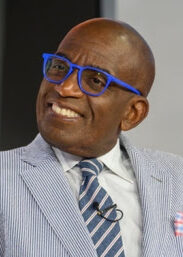 “ ‘Today Show’ weatherman and host Al Roker (pictured) revealed to fans that he was hospitalized with blood clots in his lungs and leg last week, which is why he missed the past few days of ‘Today’ broadcasts, Jordan Moreau reported Friday for Variety. “The beloved TV personality shared the news on Instagram Friday morning.” Roker said, “After some medical whack-a-mole, I am so fortunate to be getting terrific medical care and on the way to recovery. . . .”
“ ‘Today Show’ weatherman and host Al Roker (pictured) revealed to fans that he was hospitalized with blood clots in his lungs and leg last week, which is why he missed the past few days of ‘Today’ broadcasts, Jordan Moreau reported Friday for Variety. “The beloved TV personality shared the news on Instagram Friday morning.” Roker said, “After some medical whack-a-mole, I am so fortunate to be getting terrific medical care and on the way to recovery. . . .”
- Columnist Will Sutton of NOLA.com warned readers Friday, “Many of us were joyful about getting out as pandemic mandates were lifted and as recommendations came less frequently. We stopped washing our hands, stopped applying sanitizer, stopped masking indoors and stopped taking the prescribed vaccines. Despite people saying things like ‘when we were in the pandemic’ or ‘the pandemic is over,’ it’s still with us. We shouldn’t be gathering in large groups, outside or inside, without taking precautions. Otherwise, we’re putting our lives — and the lives of others — at risk. Not without precautions. COVID-19 isn’t what it used to be, but people are still getting sick and dying. Now we have a serious flu season and not enough of are prepared. . . .”
- “In the days before and after [former president Donald] Trump’s announcement Tuesday that he’s running for the White House two years after losing a re-election bid, hosts and commentators on some of Miami’s most popular Spanish-language radio programs and social-media platforms appeared to be studiously playing down any talk of a Trump-DeSantis clash,” Andres Viglucci and Lesley Cosme Torres reported Friday for the Miami Herald. Separately, Herald columnist Fabiola Santiago wrote, “Republicans resoundingly won Florida on Nov. 8 — and this week, by a slim majority, also the U.S. House of Representatives, in part, thanks to Gov. Ron DeSantis’ unconstitutional gerrymandering of congressional districts. DeSantis diluted Black voting power by redrawing maps with a white paint brush. Other voter-suppression tactics, such as making it harder to vote and arresting, close to the election, people who were given voter identification cards, affected dismal voter turnout. . . .”
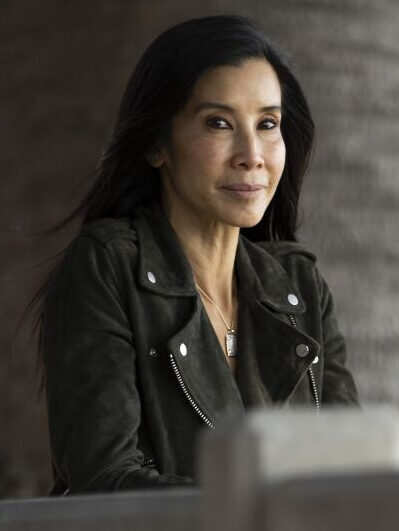 “The CNN documentary series ‘This Is Life With Lisa Ling‘ (pictured) will end its run on the network this year, a casualty of the news channel’s recently announced budget reductions,” Stephen Battaglio reported for the Los Angeles Times. “Ling confirmed to The Times that the ninth season of the series, where she often embeds herself in situations to report on the margins of American society, will be the last. The program’s final six-episode run begins Nov. 27. . . .”
“The CNN documentary series ‘This Is Life With Lisa Ling‘ (pictured) will end its run on the network this year, a casualty of the news channel’s recently announced budget reductions,” Stephen Battaglio reported for the Los Angeles Times. “Ling confirmed to The Times that the ninth season of the series, where she often embeds herself in situations to report on the margins of American society, will be the last. The program’s final six-episode run begins Nov. 27. . . .”
- Although “women and journalists of color experience the most hostility online, they also tend to be the least represented within their newsroom’s leadership,“ Kaitlin C Miller and Jacob L Nelson wrote Wednesday for Columbia Journalism Review. “Furthermore, because those in leadership are tasked with setting newsroom social media policies, these circumstances mean that women journalists and journalists of color face the highest risks when it comes to social media while maintaining the lowest levels of control when it comes to the resources and protection their organizations make available for them. The journalists we spoke with were consistent about what it would take to improve their circumstances: Newsroom leadership must become more diverse so that newsroom policy is assembled by a group of people that is representative of its staff — as well as the public at large.”
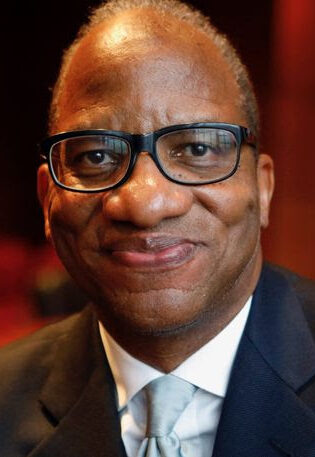 Wil Haygood (pictured), author of multiple nonfiction books chronicling the lives of 20th-century African Americans, including “The Butler,” was presented the Dayton Literary Peace Prize’s Ambassador Richard C. Holbrooke Distinguished Achievement Award at a gala Sunday. “Haygood, a Columbus native and graduate of Miami University, has spotlighted the struggles and triumphs of 20th century Black Americans from high-profile politicians to high school basketball players,” Russell Florence Jr. wrote in an August advance.
Wil Haygood (pictured), author of multiple nonfiction books chronicling the lives of 20th-century African Americans, including “The Butler,” was presented the Dayton Literary Peace Prize’s Ambassador Richard C. Holbrooke Distinguished Achievement Award at a gala Sunday. “Haygood, a Columbus native and graduate of Miami University, has spotlighted the struggles and triumphs of 20th century Black Americans from high-profile politicians to high school basketball players,” Russell Florence Jr. wrote in an August advance.
- “NBC News’ biggest stars, including at ‘Today,’ have remained silent about the ongoing drama surrounding correspondent Miguel Almaguer, whose Nov. 4 report was retracted without explanation after it suggested Paul Pelosi may not have been in immediate danger when police arrived the night he was assaulted,” Brian Flood reported Friday for Fox News.
 Gia Santos (pictured), a Mexican American described as “a bilingual journalist, writer, and advocate for immigrant rights and victims of violence,” as well as co-founder of a group called Artists4Freedom, is reporting from Ukraine. “During my time here so far, I have been able to understand the war from the perspective of Ukrainians, despite the language barrier, since a small percentage speak English well, and the rest speak primarily Ukrainian and Russian,” she wrote Wednesday for Latino Rebels. “For nearly two months I had not come across someone who could also speak Spanish, for example, until the team hosted a Spanish journalist. . . .”
Gia Santos (pictured), a Mexican American described as “a bilingual journalist, writer, and advocate for immigrant rights and victims of violence,” as well as co-founder of a group called Artists4Freedom, is reporting from Ukraine. “During my time here so far, I have been able to understand the war from the perspective of Ukrainians, despite the language barrier, since a small percentage speak English well, and the rest speak primarily Ukrainian and Russian,” she wrote Wednesday for Latino Rebels. “For nearly two months I had not come across someone who could also speak Spanish, for example, until the team hosted a Spanish journalist. . . .”
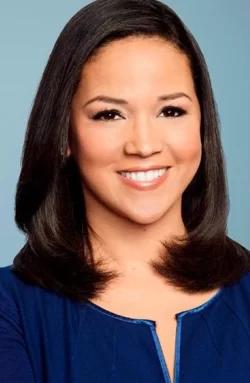 “Laura Jarrett (pictured) is leaving CNN to join NBC News, where she will cover the Justice Department and the Supreme Court,” Ted Johnson reported Wednesday for Deadline. “Her hiring comes after the retirement of longtime correspondent Pete Williams last summer. Kelly O’Donnell has covered the SCOTUS beat in the interim, in addition to her duties as senior White House correspondent. Jarrett will start in her role in January.” She is the daughter of Obama confidante Valerie Jarrett.
“Laura Jarrett (pictured) is leaving CNN to join NBC News, where she will cover the Justice Department and the Supreme Court,” Ted Johnson reported Wednesday for Deadline. “Her hiring comes after the retirement of longtime correspondent Pete Williams last summer. Kelly O’Donnell has covered the SCOTUS beat in the interim, in addition to her duties as senior White House correspondent. Jarrett will start in her role in January.” She is the daughter of Obama confidante Valerie Jarrett.

- “A slip-up by an American news anchor has launched a series of memes and products aimed at the gaffe,” Leanne Sanders reported Wednesday for APT News in Winnipeg, Manitoba. “On Nov. 3, Kyra Phillips, a news anchor on ABC in the United States, was introducing a story about Native Americans making waves in the film industry. ‘Celebrating Native American Heritage Month, when we come back we’ll take a look at Indigenous creatures taking Hollywood and pop-culture by storm,’ Phillips said on the broadcast. A week or so later, Phillips tweeted an apology for her mistake. . . .”
- The International Network of Arab and African Journalists presided over the launch of the convoy “Let’s turn the page on slavery” from the Mauritanian town of Rosso, under the supervision of the Mauritanian National Human Rights Commission, as part of Mauritania’s efforts to eradicate slavery in the country, The Point in the Gambia reported Thursday. “The Network’s participation in this campaign followed the invitation of the National Human Rights Commission, which wanted to inform the Network of the progress made in the fight against slavery in Mauritania, as well as the next steps, in particular the application of legislation and laws criminalising the phenomenon and the complaint mechanisms that the Commission offers to citizens to denounce any case of slavery in their immediate surroundings. . . .”

- “Independent journalist and political prisoner Lázaro Yuri Valle Roca was admitted to the Combinado del Este hospital, in Havana, due to his serious health condition,” LatAm Journalism Review reported via CiberCuba. [His wife Eralidis] Frómeta visited him a few days earlier in prison and said the journalist had ‘something similar to tumors’ in his head, with a secretion discharge. The Committee to Protect Journalists wrote in June, “After more than a year in pretrial detention, Cuban journalist Lázaro Yuri Valle Roca is being forced through a sham trial that could condemn him to years in prison simply for reporting,” said CPJ Latin America and the Caribbean Program Coordinator Natalie Southwick. “Cuban authorities should release Valle immediately and stop treating independent journalists like criminals.”
To subscribe at no cost, please send an email to journal-isms+subscribe@groups.io and say who you are.
Facebook users: “Like” “Richard Prince’s Journal-isms” on Facebook.
Follow Richard Prince on Twitter @princeeditor
Richard Prince’s Journal-isms originates from Washington. It began in print before most of us knew what the internet was, and it would like to be referred to as a “column.” Any views expressed in the column are those of the person or organization quoted and not those of any other entity. Send tips, comments and concerns to Richard Prince at journal-isms+owner@
View previous columns (after Feb. 13, 2016).
View previous columns (before Feb. 13, 2016)
- Diversity’s Greatest Hits, 2018 (Jan. 4, 2019)
- Book Notes: Is Taking a Knee Really All That? (Dec. 20, 2018)
- Book Notes: Challenging ’45’ and Proudly Telling the Story (Dec. 18, 2018)
- Book Notes: Get Down With the Legends! (Dec. 11, 2018)
- Journalist Richard Prince w/Joe Madison (Sirius XM, April 18, 2018) (podcast)
- Richard Prince (journalist) (Wikipedia entry)
- February 2018 Podcast: Richard “Dick” Prince on the need for newsroom diversity (Gabriel Greschler, Student Press Law Center, Feb. 26, 2018)
- Diversity’s Greatest Hits, 2017 — Where Will They Take Us in the Year Ahead?
- Book Notes: Best Sellers, Uncovered Treasures, Overlooked History (Dec. 19, 2017)
- An advocate for diversity in the media is still pressing for representation, (Courtland Milloy, Washington Post, Nov. 28, 2017)
- Morgan Global Journalism Review: Journal-isms Journeys On (Aug. 31, 2017)
- Diversity’s Greatest Hits, 2016
- Book Notes: 16 Writers Dish About ‘Chelle,’ the First Lady
- Book Notes: From Coretta to Barack, and in Search of the Godfather
- Journal-isms’ Richard Prince Wants Your Ideas (FishbowlDC, Feb. 26, 2016)
- “JOURNAL-ISMS” IS LATEST TO BEAR BRUNT OF INDUSTRY’S ECONOMIC WOES (Feb. 19, 2016)
- Richard Prince with Charlayne Hunter-Gault, “PBS NewsHour,” “What stagnant diversity means for America’s newsrooms” (Dec. 15, 2015)
- Book Notes: Journalists Follow Their Passions
- Book Notes: Journalists Who Rocked Their World
- Book Notes: Hands Up! Read This!
- Book Notes: New Cosby Bio Looks Like a Best-Seller
- Journo-diversity advocate turns attention to Ezra Klein project (Erik Wemple, Washington Post, March 5, 2014)
When you shop @AmazonSmile, Amazon will make a donation to Journal-Isms Inc. https://t.co/OFkE3Gu0eK
— Richard Prince (@princeeditor) March 16, 2018

